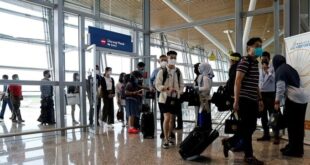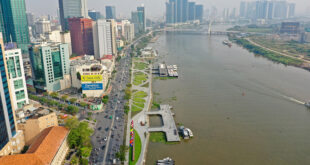Nestled in a quaint corner of Hoa Binh Lake, around 100 km west of Hanoi, you can discover a community whose lives have been transformed over the last decade.
Families who previously had very little are now operating homestays that are often teeming with guests on the weekend, largely thanks to the non-profit Community Based Tourism (CBT) initiative supported by the NGO Action on Poverty.
Da Bac Community-Based Tourism is a social enterprise that helps create sustainable incomes for families in the area. It particularly focuses on a network of three remote ethic minority villages: Sung, Da Bia and Ke, all in Da Bac District of Hoa Binh Province.
“The AOP project has helped my family a lot from poverty to becoming more stable,” Bui Thi Nhem, who runs a homestay in Da Bia Village, said of the impact it had on her family.
“CBT Da Bac has also sent a number of visitors to my family, equal to half of my retail customers. In the past, foreign guests used to come a lot and stay here, but since Covid the numbers have decreased. Now, Vietnamese tourists often come on weekends.”
The Da Bac project was started with Australian philanthropist, Dr Vance Gledhill. In 2014, he visited Da Bac district and learned that a hydro-electric dam displaced several farming communities from their fertile lowlands in Hoa Binh. The rugged upland terrain made villagers’ traditional farming practices ill-suited to meet their daily needs.
Gledhill, who operates similar NGO projects in Africa, met with Vietnamese authorities to discuss the Da Bac project and has been contributing multi-year grants to it.
Nhem explains the process of how the project assisted her: “First, AOP will survey in your locality and select a household to work as a homestay. My house was chosen first. After that, they gave me a loan, and helped train me to run a homestay, how to receive guests and training in cooking. At first, they introduced independent customers, then they connected them with sources of tourists from travel companies.”
 |
|
A homestay host (standing, 4th, R) poses for a photo with her foreign guests in Da Bac District, Hoa Binh Province. Photo courtesy of the homestay |
The training in hospitality, basic conservational English classes and food preparation instruction are the crucial ingredients for running a successful homestay in northern Vietnam. In the last eight years the CBT project in Da Bac has attracted over 20,000 visitors, including 30% international guests. This has also generated nearly half a million dollars in revenue in the area, directly benefiting over 6,000 individuals. A portion of these profits has also been invested into a community fund that is used for infrastructure upgrades.
The support and togetherness of the community is evident in Da Bac, as all the homestays provide the same options at the same prices.
Considering that overtourism is an increasingly growing problem in popular northern regions such as Sa Pa, locals and tourists would hope that Da Bac may continue to blossom as an alternative destination for those who enjoy the peaceful mountainous regions of northern Vietnam.
- Reduce Hair Loss with PURA D’OR Gold Label Shampoo
- Castor Oil Has Made a “Huge” Difference With Hair and Brow Growth
- Excessive hair loss in men: Signs of illness that cannot be subjective
- Dịch Vụ SEO Website ở Los Angeles, CA: đưa trang web doanh nghiệp bạn lên top Google
- Nails Salon Sierra Madre
 VnExpress News The News Gateway of Vietnam
VnExpress News The News Gateway of Vietnam



